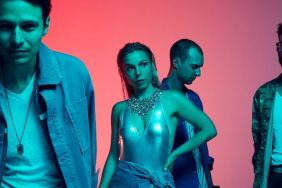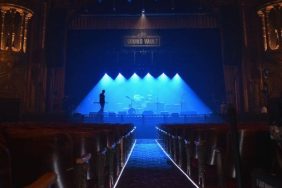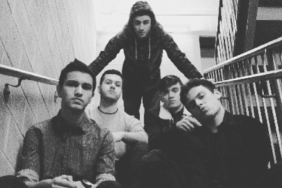Third Man Records nucleus Jack White stands far and above the rest in showmanship, musical versatility and the trick-up-his-sleeve essence of exhilarating unpredictability. Having crafted a legacy as a phenomenal performer in the White Stripes era, White’s time with The Raconteurs and The Dead Weather expressed an unlimited potential for musical endeavors. Last week we delivered the first installment of our interview series with Jack’s band(s), featuring an in-depth look at the players and experiences around the recording sessions for what would become his second solo LP Lazaretto. In the second part of the series, we take a closer look into the process of actually joining the band, how each member came to know Jack and preparing for the highly ambitious tour to follow.
When Jack White first announced that he would launch a solo career, back in 2012, speculation ran wild on how he would tour such a project. In support of Blunderbuss, White surprised his audiences by performing with two separate bands – the all-male Buzzards, and the all-female Peacocks. In a rather unique format, each night Jack would choose one of the bands to perform with, or sometimes take turns with each during a single concert. It was a revolutionary approach that made for a unique spectacle to witness every night. Add the fact that the bands never, ever performed with a setlist, and you’ve got the makings of the concert experience of a lifetime. When it came time for 2014’s Lazaretto and its accompanying tour, White trimmed the two bands down to one, but maintained the unpredictability and arguably made the band even more powerful.
One can only imagine the effort that went into preparing for such a mammoth of a tour. Besides playing without a setlist, White would perform songs from his back catalog with The White Stripes, The Raconteurs and The Dead Weather. We were happy to speak to members Dominic John Davis (bass), Daru Jones (drums), Fats Kaplin (lap steel / theremin), Lillie Mae Rische (violin / vocals), and Cory Younts (mandolin / harmonica) all of which were featured on both of Jack White’s solo LPs and accompanying tours, and singer Ruby Amanfu, who was around for the first tour cycle but is now about to launch a solo record of her own. Below, in our second of four interview installments, the various players discuss how they first got into the band, and how they rehearsed such a ridiculous amount of songs.
-
GETTING INTO THE BAND

Did you audition for the band? Were there auditions at all?
Fats: No, I didn’t audition. And Jack would never have that. He would just know somebody was [the right player]. I started working with Karen Elson, Jack’s ex-wife. And I got called by Lalo, the tour manager, to do some shows and go to Europe with her. They needed someone to play steel guitar and fiddle. So I went to Europe with her, a number of years ago, and when we were rehearsing all that I met Jack. When I came back, Jack called me, he was doing one of the Blue Series singles, and he called me to go up there. I think it was First Aid Kit, two girls from Sweden, so I went in and played pedal steel on that.
Soon after that I got another call, and I started working all the time at the studio, doing these TMR singles. And Jack was doing a lot of producing of the singles at that point. And then we started recording, slowly, bits and pieces of what was to become Blunderbuss. So I became part of a small group of players who would get called for sessions.
How did you meet Jack?
Daru: I met Jack through a hip-hop situation, an artist I was touring with, Black Milk, from Detroit. Black had this project called Album of the Year, which I played drums on, and there’s a track on it called Deadly Medley, which has a rock guitar sample. Jack had started doing these collaborations for TMR, and from what I was told, he was big on hip-hop and he heard this song, and he got excited. So he reached out to Black Milk’s management, if he wanted to do a collaboration. So I guess when they were talking about him coming to Nashville, I think Jack offered to use people from Nashville for the show, but Black Milk said he had his own guys that he takes on the road.
We flew down to Nashville, we did a session for TMR, with Jack. And we also had a performance at TMR. I knew Jack was a drummer. And there’s a song on the set called Losing Out, and I have a drum solo on it. Basically, after I did the drum solo, Jack was in the back of the room, he ran to the front and he got excited like, “yeah!”.
Anyway, I went back home to New York, and a few months later his team reached out to me about coming to Nashville, he was doing a collaboration with RZA from Wu-Tang Clan, one of my favorite producers. So I flew out to Nashville, and right as I get in the studio, RZA cancels the session. So it’s kinda heartbreaking. Anyway, Jack felt bad, he said, “I’ve got some songs I’ve been working on, maybe we can try those out?” From what I was told, those songs that we tracked ended up starting Blunderbuss. It turned out to be a blessing. So that’s how all of that got started.
Cory Younts: I met Jack Lawrence first at a bar that I was playing piano at. 2004 I think. He mentioned me to Jack White and I met him at a Time Jumpers show. He was leaving as I was walking in. We talked for a minute. I must’ve given him my number. He then called me a few months later. I think my first session was The Smoke Fairies. I then went on to do more sessions over the years for Third Man. Then in January of 2012 I got the call to be in his band touring the Blunderbuss album.
Ruby Amanfu: I got the call to come in to his studio to meet him one morning in January of 2011. He was putting together the touring band for Wanda Jackson’s promo run for her new album. I went to his studio and they happened to be working on Chris Thile and Michael Daves’ Blue Series that day. He ended up calling me into the tracking room with the band and put me on percussion for the B-side track, “Blue Night” and backing vocals for their single, “The Man in The Middle”. That was a fun way to be introduced!
So some weeks after that, I ended up doing the promo tour with Jack and Wanda. From that point on, we had a nice flow and I ended up singing on various projects Jack was producing like for Seasick Steve, and any number of tunes of his own. The rest happened naturally.
Dominic: I’m from Detroit, so I met Jack when we were kids, and we kinda learned how to play music together. My family wasn’t musical, his family was. All of his older brothers were in bands, and they had a lot of equipment at the house, so that’s sorta where we started playing. For him and I, we kinda speak the same language in music.
Lillie: I was called for a session, Jack was doing a soundtrack for The Lone Ranger, which he ended up backing out of, but that was when they first called me and my friend Josh Smith, who is Jack’s engineer and also a tech on the road. He recommended me and they just kept calling me. I played on one song on Blunderbuss, the first recording I did with Jack.
-
PREPARING / REHEARSING

When Jack was putting the band and the album together, were there any times when you felt like, “I don’t know if this is gonna work or not”?
Lillie: Absolutely. I almost didn’t take the gig in the first place. I’m glad I did, but I had my family band that had just broke up, and had it not broken up, I wouldn’t have taken the gig. Because I was fully dedicated to my own project, you know. But I’m very glad I took the gig, I met some amazing people and friends for a lifetime, and got to play some really cool music and it’s been a really good experience for me, as far as branching out of my small world, musically. It’s been awesome. I’ve been turned on to all different kinds of stuff.
With Jack, there’s no setlist, ever, and you have no idea what’s gonna happen from song to song, in what order, what it is.
How much time did you spend on rehearsals before your first tour?
Dominic: 2 months. But it was just him coming in and starting a song, it wasn’t like, “let’s do this, let’s do that”. He tried to run a rehearsal like he would play a show. When he first called me to do the whole thing, he said that with The Raconteurs and The Dead Weather they had to be a little more structured, they’re bands with more than one songwriter, and he was hoping he could do with a full band what he did with The White Stripes. He asked me if I thought he could do it, and I said, “yeah, we just need to work on it.” It took a little while to figure it out. We didn’t have to just learn all the Blunderbuss material, we had to learn everything. So we were learning all the White Stripes songs, everything.
Cory Younts: Well, the rest of the Buzzards already had rehearsed for about a month and I was the last to get hired. I was a little nervous cause I hadn’t played rock n roll in a band for several years. But all the rest of the guys were so great that we seemed to all fall in with each other and the outcome was great.
Did you have to study parts in your spare time?
Dominic: Yeah, they sent us 60 or 70 songs. So yeah, it’s a lot of learning to do, especially when you’re playing someone else’s parts. And with the White Stripes material it’s really hard because there’s no parts.
Were there any songs that you knew would never pop up?
Lillie: No, not at all. Not to my knowledge. There were songs that were… well, after Ikey passed away, we never played “I Cut Like a Buffalo” again. It just never happened, and that was one that we said, “I don’t think we’re gonna play this one again”.
I was wondering what happened to all the Dead Weather songs, especially that one, so I guess that explains it.
Lillie: Yes sir. But, if you know me, I don’t know what a Dead Weather song is versus a TWS song, I have no idea. I learned them all at the same time. [laughs] I have no idea. I’ll ask, “which one is this one from? what record is that?” Like, I know now that Steady as She Goes was by the Raconteurs, but I didn’t know Jack’s music before I started playing with him. I didn’t know it at all.
When you performed with Robert Plant in Argentina, did you rehearse before the gig?
Fats: No, and in fact… with Jack, there’s no setlist, ever, and you have no idea what’s gonna happen from song to song, in what order, what it is. Sometimes he’ll even point me to a different instrument than you would usually play. And because of that… we got off stage, and I didn’t see Robert Plant then. We were going back for the encore, and Jack said “Icky Thump”. We went back out, we started playing, and then Jack just started playing and Robert walked out, we had no idea he was going to do that. And we had never played the full song before, and that’s typical.
That’s amazing.
Fats: It is! [laughs]
You also performed with Q-Tip a while ago. Was that also off the cuff?
Fats: Well that we actually did rehearse. We got into New York City, we came in the night before and rehearsed those two songs. Which for Jack is very unusual. Because it was a big deal, it was Madison Square Garden, so I guess he wanted to rehearse it.
-
TOURING WITH TWO BANDS

Did the two bands travel in different tour buses?
Fats: No, all of us in the same bus.
That’s a bunch of people.
Dominic: Normally you only have so many bunks in a bus, and normally you have a couple of extras to put things on. But we had 12 people in twelve bunks, so… I think that was good though. At first, it was a little strange not playing every night, but being able to be together made it seem more like one band.
Daru: Woo, it was crazy. [laughs] But we made it. But at the end of the day, I’m grateful, just to have a job and pay my bills. Gotta keep it moving.
How did Jack trim it down to one band?
Dominic: I think, honestly, it was just the people that could do it, because everybody else has so much going on. Ruby [Amanfu] was singing with Hozier, Brooke [Waggoner] just had a baby, Carla [Azar] was in that movie Frank, Cory [Younts] is playing with Old Crow Medicine Show. It was very last minute that we found out we were going out. Maybe in March last year. I think he might’ve wanted to do both bands again, but it just couldn’t happen.
Logistically, it sounds like a nightmare, so many people with that much equipment. One cool thing I saw was that sometimes Jack played an acoustic song in the middle of the set, while the stage was being set for the second band to play.
Fats: We actually didn’t do that switch very often, though.
Dominic: We were going to do that more often and share a lot more gear, but pedal steels can’t really be shared, and the drum kits were so particular that we also wound up not sharing them. So once we had two kits, they decided to change everything for each band. And I think at some point they had the switch down to three minutes, but we didn’t have both bands on that often.
How did you feel about not playing some nights, when the Buzzards were the chosen band?
Ruby Amanfu: They are my brothers so I felt proud. I was dancing alongside stage.
Was there a specific direction in trying to make one band different from the other?
Lillie: Not necessarily. Each group had their slightly different arrangements, but we all generally played the same songs, minus a couple different ones for each one. But how am I to know exactly what Jack was going for in his head? I don’t know. But it was pretty loose as well, it wasn’t completely different. There were a couple of shows when he got me up to play with the boys, and it was generally the same idea. I mean they were definitely a lot heavier for sure, musically.

It seems to me that the Peacocks had more of a dream-like quality.
Lillie: Absolutely. But I guess that’s what you’re supposed to get from a bunch of women in long dresses.
When you had the two bands, did it really feel like one band, united?
Lillie: Absolutely. I mean, even now, obviously I’m from the girl band, but all the guys were from the same group, and it still felt like one big band to me. To me, anyway, I don’t know what the other ones would say.
How did it go from one band to two bands?
Lillie: I think he would’ve liked to do two bands again. I think that it just didn’t work out. Some folks had some scheduling interference. I mean, he could’ve gotten whoever he wanted for the tour, he wasn’t obligated to get the same members, but he didn’t. Maybe if he didn’t get certain people, he wouldn’t want to do it, but I’m not sure.
Was there ever a sense of competition between the two bands, even a friendly one?
Lillie: There shouldn’t have been. Unfortunately, there was a little bit. There should not have been, because it wasn’t a competition for playing a slot or anything. I think, more than anything, it was people wanting to play. If you’re on tour, there are ten gigs, and you only get to play five, that kinda sucks. I think that was the hardest part, everybody wanted to play, nobody wanted so many days off. But, yeah, there should not have been any competition, but there was a little bit, unfortunately. Too many hens in the hen house, etc.
Do you think you’ll ever come across a group of musicians like this again? Or another one just as good?
Daru: Who knows? It’s been great, everybody’s nice. I’ve been in a lot of situations. It feels like a family, we’re all close, and it shows on stage. This has been my first time in this kind of situation. And it was a lot more different in 2012 when we had the two bands. That was definitely an experience. [laughs]
Read the entire “On Road & Record” interview series with Jack White’s band.
Photos by David James Swanson via JackWhiteIII






